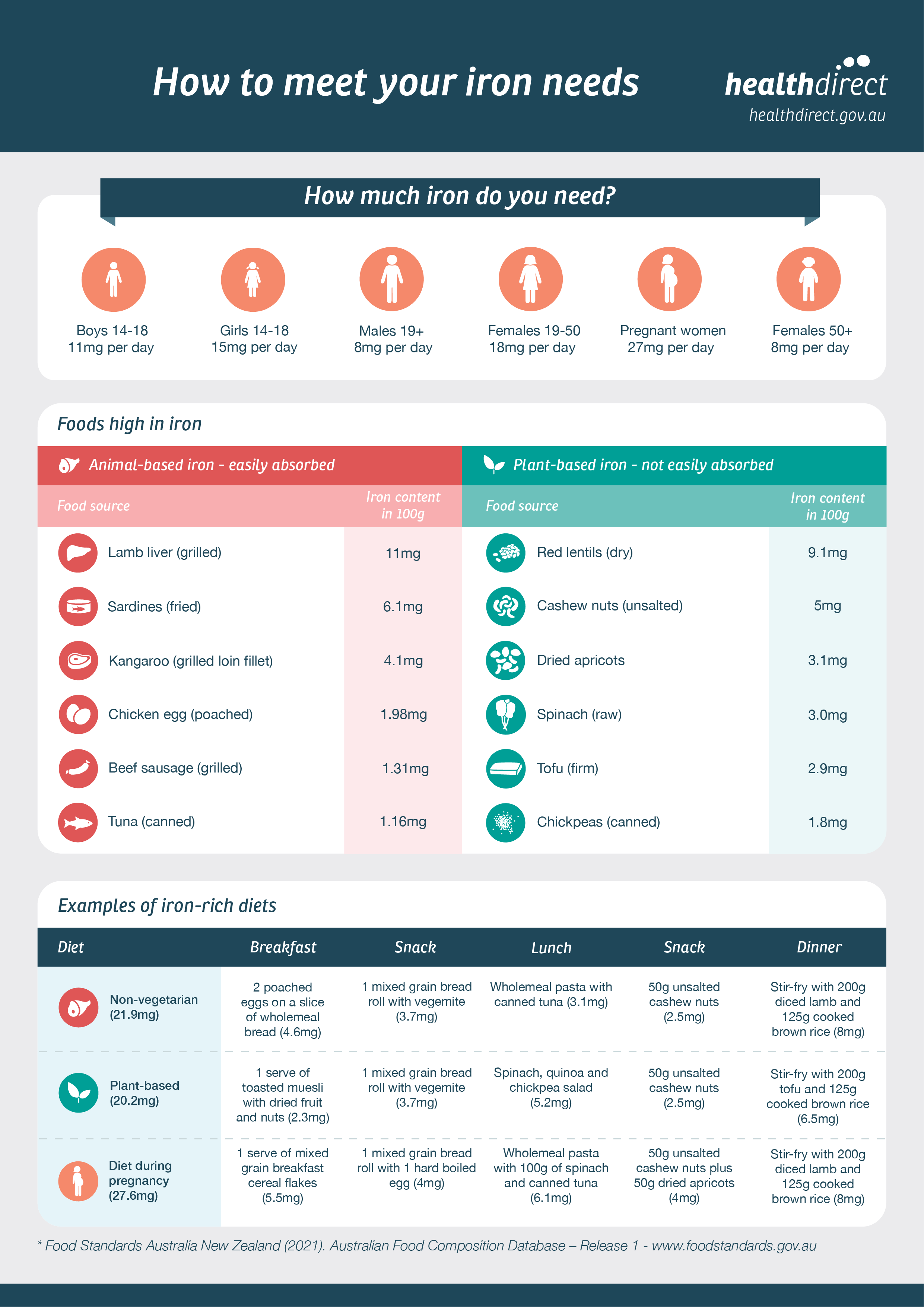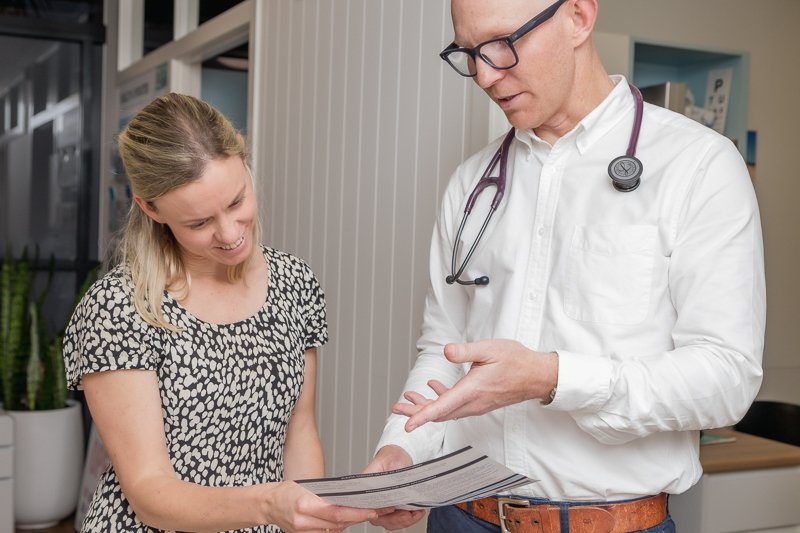Iron Infusions in Peregian Beach
Note: due to a current worldwide shortage of saline solution, we are not able to offer iron infusions. We expect this situation will remain until March 2025. We will update this website when the situation changes.
Why do you need iron?
Iron is an essential mineral that provides energy for daily life. It plays an important role in transporting oxygen in your blood.
You can increase your iron levels by eating more iron-rich foods like red meat, iron-fortified breakfast cereals or plant-based sources like lentils (though these are not absorbed as easily).
Infographic courtesy of Healthdirect Australia.
This regular top-up is necessary because you lose iron when you sweat, shed intestinal cells or experience blood loss.
If your iron levels are low, you might experience symptoms like:
Weakness
Deep tiredness
Feeling breathless
Poor memory
Reduced concentration
More frequent infections (low iron means a less effective immune system).
If you show symptoms of low iron, we’ll order a blood test to check your levels. If your iron levels are low, then we need to identify the cause and provide the right treatment.
Why might you have iron deficiency?
This is a very important question. Low iron is a symptom of something – so we need to know what that something is.
We never rush to treatment without understanding why your iron levels are low. Often our investigations will show nothing out of the ordinary, meaning that your diet is the probable cause of your low iron levels.
But sometimes, investigating the cause of low iron enables us to identify more significant health issues, meaning we can start treatment for the cause as well as the symptom.
There are several causes of iron deficiency, including diet, underlying medical conditions that affect iron absorption, and blood loss.
Not getting enough iron in your diet
Your body stores and uses iron but can’t make it, meaning that iron has to come from an external source, namely your food.
Particular stages of life require more iron. Iron is particularly vital for babies (through breastmilk or iron-fortified formula), children, teenagers (especially girls), women who have periods, are pregnant or are breastfeeding.
If you’re a vegetarian or vegan, then it’s important to eat plenty of iron-rich foods from plant sources.
Not absorbing enough iron
Iron is absorbed through your stomach and bowel. That means anything that affects your stomach or bowel may affect your ability to absorb iron. Coeliac disease often results in low iron absorption as do some types of bariatric surgery.
Losing iron due to blood loss
Women and girls who have heavy periods are particularly prone to low iron levels. Blood is full of iron and, if your periods are heavy, you’re losing a lot of it every month.
Ulcers, bowel polyps or cancer can also cause internal bleeding that reduces your iron levels. Identifying these causes enables prompt treatment to protect your health and wellbeing.
Needing a high level of iron
If you’re pregnant or breastfeeding, you will temporarily need more iron than usual to meet the extra demands on your body.
Initial treatment for low iron levels
Once we’ve identified and addressed the underlying cause of your iron deficiency, we then need to start treatment to boost your iron levels.
Initial treatment for low iron levels may involve:
● Adjusting your diet to ensure you eat more iron-rich foods
● Consuming more vitamin C, which helps you absorb iron
● Taking iron supplements in either liquid or tablet form.
Treatment with diet and supplements isn’t always enough though. It might not meet your needs if you struggle with the side-effects of iron supplements, if you have underlying conditions that affect iron absorption or if you need a rapid improvement in your iron levels. That’s when we might recommend an iron infusion.
What’s an iron infusion?
An iron infusion drip feeds iron directly into your bloodstream to replenish your iron levels quickly.
It can take about an hour so bring a book or something to entertain you (remember headphones if you plan to watch something on your device). Our staff monitor you at regular intervals to ensure everything is going well.
What are the benefits of an iron infusion?
Iron infusions can be beneficial because they:
Bypass your digestive system and go directly to your bloodstream, overcoming any absorption problems caused by digestive conditions or weight loss surgery
Replenish your iron all in one go, providing faster relief of symptoms compared to months of taking oral supplements
Can now be done from the convenience of your doctor’s clinic rather than involving a trip to hospital.
Iron infusions at Peregian Family Medical Centre
We’re pleased to offer iron infusions on the Sunshine Coast at Peregian Family Medical Centre, knowing this will be a valuable service to our local community.
With the exception of Dr Anita Holland, all of our doctors perform iron infusions. The cost for your initial iron infusion consultation to consent you for the procedure is covered under the Medicare rebate if this is the only matter discussed at the appointment. The cost of your iron infusion itself is $242.70 with a Medicare rebate of $79.70, so your out of pocket cost is $163.00. You will also need to purchase the Iron medication from the pharmacy and bring it to your infusion appointment. Depending on the Pharmacy, and your concession status, this may cost up to $40. Iron infusions cannot be ‘bulk-billed’ due to costs incurred by the practice not covered by Medicare.
If you’re experiencing symptoms of low iron, then please make an appointment with your GP for an initial consultation and, if warranted, an iron test. Depending on your test results and your broader medical history, you and your GP can then discuss whether further investigations are needed and if you would benefit from an iron infusion.






